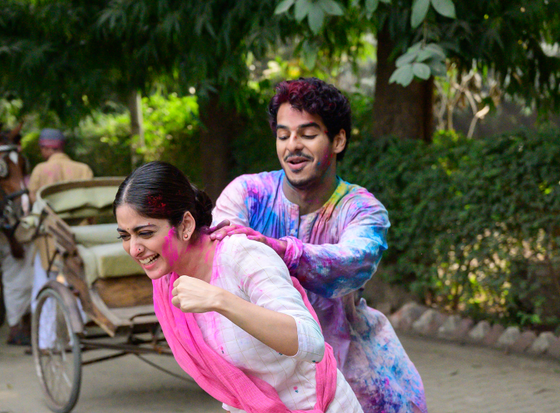A pseudo-progressive show about revenge, power and politics, that falls flat even after following the formulaic template as it becomes a show about sons having enormous daddy issues and constantly trying to prove their worth.
“Jab ghar ke do mard baat kar rahe ho, tab aurat beech main nahi bolte”, “Isliye auraton ko bahar nahi bhejte, sahas badh jaata hai”. It’s 2020, we live in a world that talks about being progessive, equal and liberal. However, patriarchy is still a tool very prominent in society. Films, a medium of instruction other than just entertainment, should be a channel for promoting these thoughts but filmmakers use this lazy, overused technique even in the present time to fuel their narrative, in this case, a rather violent one.
The makers stand confused with their stance of liberalism. Women assert their dominance within the show, but only just sporadically, while all the other times they’re demeaned by their male counterparts as their way of asserting that they are the real “men”. Some plot points exist only to tick mark boxes, but the power and positioning given to women seems quite hollow, and there just to be there, doesn’t add much to the overall scenario.
The first episode starts with a scorpion crawling in the middle of the road like it owns the place. We soon hear the sound of cars coming through and we expect that they will crush the animal without realising. However, the scorpion escapes and lives to fight another day. Season 2 of Mirzapur picks off right where the previous one ended. The scars of the battleground have deeply affected those who survived the massacre. After killing Bablu (Vikrant Massey) and Sweety (Shriya Pilgaonkar), a rather unconscious Munna (Divyendu Sharma) wakes up to a nightmare of killing the one that escaped, Guddu (Ali Fazal) and on the other hand, Guddu also wakes up to the same nightmare, but this time him killing Munna. Even before the show starts, we know what it’s going to be about, old school revenge and the desire to be in power.
Munna goes back to his original wish, wanting the throne of Mirzapur, and wanting to prove to his father Akhandanand Tripathi or Kaleen Bhaiyya (Pankaj Tripathi) how he is the rightful heir, while Kaleen bhaiyya sets his eyes on the next chapter for himself, respect and the power that comes with it, in other words, a seat in the UP cabinet. Guddu has been shot in his knee, and while he feels powerless, he doesn’t let go of the fire boiling inside of him. Golu (Swetha Tripathi), who has one of the most redefining arcs, finds herself haunted in her past, wanting vengeance and rising from above the shadows of fright to having nothing to lose.
This season is primarily about vengeance and old school revenge, but also essentially sons trying to get out of the clutches of their overpowering, controlling fathers and wanting to prove their worth. The show, which seems to be a slow burn, seems to be played out like an orchestrated but passive chess game, while the audience knows that both sides are gearing up for a huge face off when the time comes. The goal is the same, for the older players, and the new ones introduced in this season, the throne of Mirzapur, and the only way to achieve that for all parties is gory violence and bullet wounds and less of psychological warfare, another place where the show takes a hit because it does nothing to seem fresh or be a little out of the box.
There are also a few new faces, added to the ensemble, and also to the narrative, and most of them add nothing to the main narrative, and neither is their sub-plot fulfilled. Sharad Shukla, son of Rati Shankar, who Guddu killed in season 1, is shown taking his father’s throne with the same dream that his father had, Mirzapur, only he uses his mind more than muscle. The Tyagi’s, Dadda Tyagi (Lilliput and his twins Senior and Junior Tyagi (Both played by Vijay Varma), a businessmen family from Bihar. They aren’t directly connected to the main narrative, but seem to be catalysts for both sides.
Awaiting the big reveal, the show feels like a slow burn getting there because everybody knows what climax is to come, and the fact that it arrives at it in the template way, it loses its charm with continuity as well, both physical and emotional. It gets painfully difficult keeping track of the backstabs and the alliances and the real motives behind individual parties forming their alliances since there isn’t much one can relate with their deep-rooted obsession and hence that plot falls flat.
The most redeeming part about the show is the performances by key characters and the journey the set to fulfil. An eccentric misfit like Munna goes through great transformation and actually takes up responsibility and maturity and such an arc for this character seems legible as a loose cannon doesn’t have the pressure to maintain continuity, especially in terms of emotion. Another character that takes up a really strong journey, is Beena (Rasika Dugal), a woman who was reduced to a sex toy by her father-in-law, uses the same tactics of tease to survive amidst the chaos. Guddu and Golu as a team together makes them interesting as they essentially feel like the two wrong siblings forced to become the people, they aren’t due to the circumstances.
All in all, the second instalment of Mirzapur will be easily entertaining for the masses as it is much more vocal, and action driven than it is about the characters that drive the plot. The script is carefully constructed to make it look chaotic and full of stars in the frame, so that it draws attention away from the obvious thematic blunders that it makes. Dialogues are reduced to catchy one-liners that don’t add to taking the narrative forward, but for sure will be catch phrases for many for weeks to come, and that’s all that matters at the end of the day for most, easy masala entertainment, and which is why Mirzapur will still continue to be liked by many.










